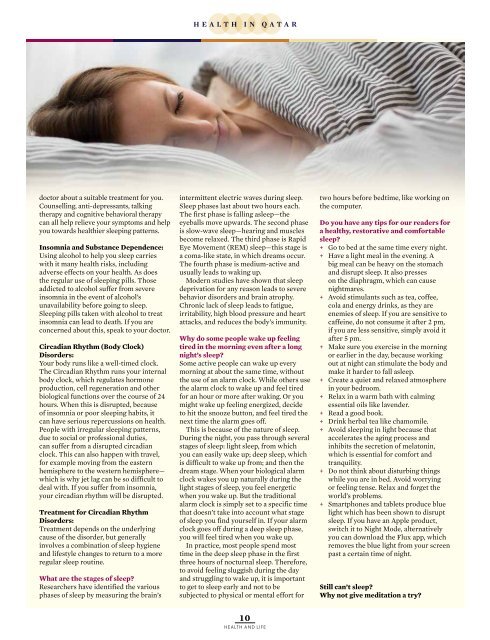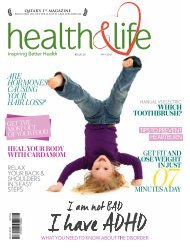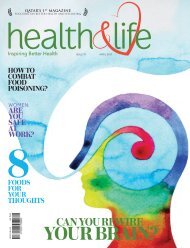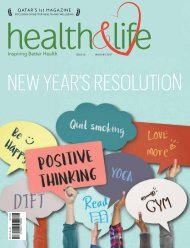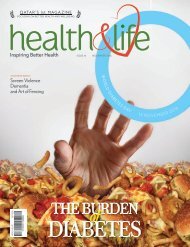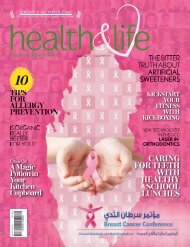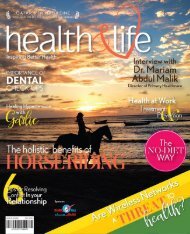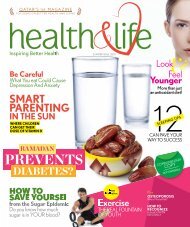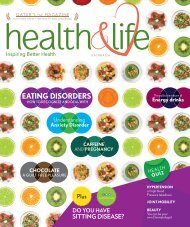Health & Life Magazine March 2017
Health & Life Magazine March 2017 www.health-n-life.com
Health & Life Magazine March 2017
www.health-n-life.com
You also want an ePaper? Increase the reach of your titles
YUMPU automatically turns print PDFs into web optimized ePapers that Google loves.
HEALTH IN QATAR<br />
doctor about a suitable treatment for you.<br />
Counselling, anti-depressants, talking<br />
therapy and cognitive behavioral therapy<br />
can all help relieve your symptoms and help<br />
you towards healthier sleeping patterns.<br />
Insomnia and Substance Dependence:<br />
Using alcohol to help you sleep carries<br />
with it many health risks, including<br />
adverse effects on your health. As does<br />
the regular use of sleeping pills. Those<br />
addicted to alcohol suffer from severe<br />
insomnia in the event of alcohol’s<br />
unavailability before going to sleep.<br />
Sleeping pills taken with alcohol to treat<br />
insomnia can lead to death. If you are<br />
concerned about this, speak to your doctor.<br />
Circadian Rhythm (Body Clock)<br />
Disorders:<br />
Your body runs like a well-timed clock.<br />
The Circadian Rhythm runs your internal<br />
body clock, which regulates hormone<br />
production, cell regeneration and other<br />
biological functions over the course of 24<br />
hours. When this is disrupted, because<br />
of insomnia or poor sleeping habits, it<br />
can have serious repercussions on health.<br />
People with irregular sleeping patterns,<br />
due to social or professional duties,<br />
can suffer from a disrupted circadian<br />
clock. This can also happen with travel,<br />
for example moving from the eastern<br />
hemisphere to the western hemisphere—<br />
which is why jet lag can be so difficult to<br />
deal with. If you suffer from insomnia,<br />
your circadian rhythm will be disrupted.<br />
Treatment for Circadian Rhythm<br />
Disorders:<br />
Treatment depends on the underlying<br />
cause of the disorder, but generally<br />
involves a combination of sleep hygiene<br />
and lifestyle changes to return to a more<br />
regular sleep routine.<br />
What are the stages of sleep?<br />
Researchers have identified the various<br />
phases of sleep by measuring the brain’s<br />
intermittent electric waves during sleep.<br />
Sleep phases last about two hours each.<br />
The first phase is falling asleep—the<br />
eyeballs move upwards. The second phase<br />
is slow-wave sleep—hearing and muscles<br />
become relaxed. The third phase is Rapid<br />
Eye Movement (REM) sleep—this stage is<br />
a coma-like state, in which dreams occur.<br />
The fourth phase is medium-active and<br />
usually leads to waking up.<br />
Modern studies have shown that sleep<br />
deprivation for any reason leads to severe<br />
behavior disorders and brain atrophy.<br />
Chronic lack of sleep leads to fatigue,<br />
irritability, high blood pressure and heart<br />
attacks, and reduces the body’s immunity.<br />
Why do some people wake up feeling<br />
tired in the morning even after a long<br />
night’s sleep?<br />
Some active people can wake up every<br />
morning at about the same time, without<br />
the use of an alarm clock. While others use<br />
the alarm clock to wake up and feel tired<br />
for an hour or more after waking. Or you<br />
might wake up feeling energized, decide<br />
to hit the snooze button, and feel tired the<br />
next time the alarm goes off.<br />
This is because of the nature of sleep.<br />
During the night, you pass through several<br />
stages of sleep: light sleep, from which<br />
you can easily wake up; deep sleep, which<br />
is difficult to wake up from; and then the<br />
dream stage. When your biological alarm<br />
clock wakes you up naturally during the<br />
light stages of sleep, you feel energetic<br />
when you wake up. But the traditional<br />
alarm clock is simply set to a specific time<br />
that doesn’t take into account what stage<br />
of sleep you find yourself in. If your alarm<br />
clock goes off during a deep sleep phase,<br />
you will feel tired when you wake up.<br />
In practice, most people spend most<br />
time in the deep sleep phase in the first<br />
three hours of nocturnal sleep. Therefore,<br />
to avoid feeling sluggish during the day<br />
and struggling to wake up, it is important<br />
to get to sleep early and not to be<br />
subjected to physical or mental effort for<br />
two hours before bedtime, like working on<br />
the computer.<br />
Do you have any tips for our readers for<br />
a healthy, restorative and comfortable<br />
sleep?<br />
+ Go to bed at the same time every night.<br />
+ Have a light meal in the evening. A<br />
big meal can be heavy on the stomach<br />
and disrupt sleep. It also presses<br />
on the diaphragm, which can cause<br />
nightmares.<br />
+ Avoid stimulants such as tea, coffee,<br />
cola and energy drinks, as they are<br />
enemies of sleep. If you are sensitive to<br />
caffeine, do not consume it after 2 pm,<br />
if you are less sensitive, simply avoid it<br />
after 5 pm.<br />
+ Make sure you exercise in the morning<br />
or earlier in the day, because working<br />
out at night can stimulate the body and<br />
make it harder to fall asleep.<br />
+ Create a quiet and relaxed atmosphere<br />
in your bedroom.<br />
+ Relax in a warm bath with calming<br />
essential oils like lavender.<br />
+ Read a good book.<br />
+ Drink herbal tea like chamomile.<br />
+ Avoid sleeping in light because that<br />
accelerates the aging process and<br />
inhibits the secretion of melatonin,<br />
which is essential for comfort and<br />
tranquility.<br />
+ Do not think about disturbing things<br />
while you are in bed. Avoid worrying<br />
or feeling tense. Relax and forget the<br />
world’s problems.<br />
+ Smartphones and tablets produce blue<br />
light which has been shown to disrupt<br />
sleep. If you have an Apple product,<br />
switch it to Night Mode, alternatively<br />
you can download the Flux app, which<br />
removes the blue light from your screen<br />
past a certain time of night.<br />
Still can’t sleep?<br />
Why not give meditation a try?<br />
10<br />
HEALTH AND LIFE


